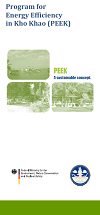
Program for Energy Efficiency in Kho Khao Hotels (PEEK), Thailand - PEEK OVERVIEW
Thailand for the most part depends on fossil fuels for its energy supply. Petroleum and natural gas account for almost the entire volume of Thailand’s energy imports. But in view of the growing scarcity of raw materials and the impact of their continuous use, the search for alternative sources of energy assumes pressing importance. Thailand signed the United Nations Framework Convention on Climate Change in 1992. Since then, numerous measures have been taken to improve energy efficiency. As part of its long‐term energy policy Thailand aims to boost energy efficiency measures and increase renewable energy as part of its energy mix.
The “Program for Energy Efficiency in Kho Khao (PEEK)” is financed by the German Federal Ministry for the Environment, Nature Conservation and Nuclear Safety under the International Climate Protection Initiative. The initiative supports climate protection projects worldwide in developing, newly industrializing and transition countries in order to contribute effectively to emission reductions and adaptation to climate change. The PEEK project is being implemented by the UNWTO Consulting Unit on Tourism and Biodiversity in collaboration with Adelphi, Berlin.
The island of Kho Khao lays 130 km to the North of Phuket on the Andaman coast and forms part of the Province of Phang Nga and the District of Takua Pa. The island has an area of approximately 22 sq. km and some 880 inhabitants. It is supplied with electricity from the mainland. The island is approached by ferry. It was opened up for tourism some 15 years ago when the last of the tin mines in the province was shut down. The resort owners in Kho Khao are the key stakeholders in implementing the PEEK project.
PEEK Objectives and Goals

- Stakeholder engagement and information dissemination
- Energy efficiency measures
- Solar thermal collectors
- Feasibility study for decentralized energy supply
Through its model character, the project aims to induce the island to switch over to regenerative energy supply which has the potential for broad-based application. At the same time, efforts are being made to create greater acceptance for sustainability and climate protection strategies both in the tourism sector and among the local population.
Target Groups
The target groups are:
- Resorts and local municipalities in Kho Khao
- Local hotel and tourism associations
- Eco-tourism organizations as well as the concerned state authorities



